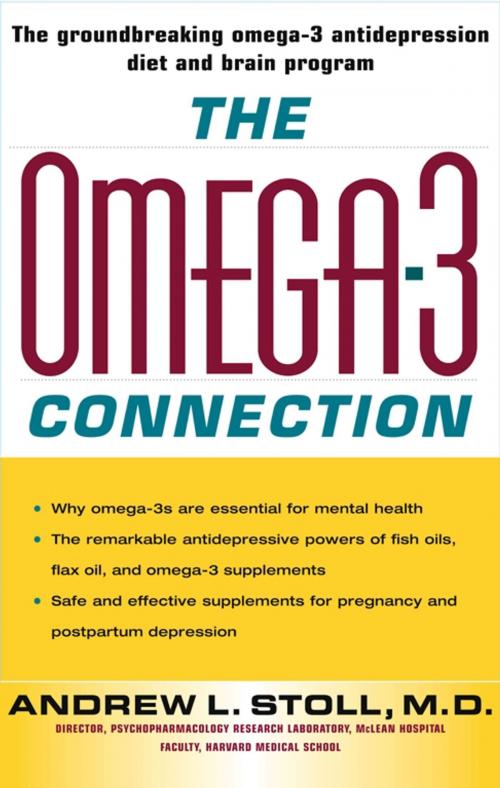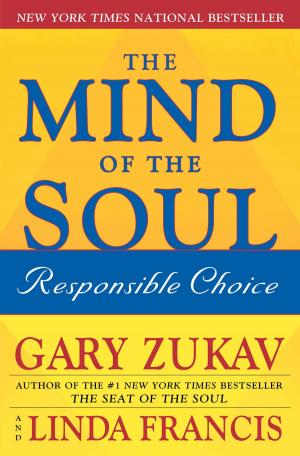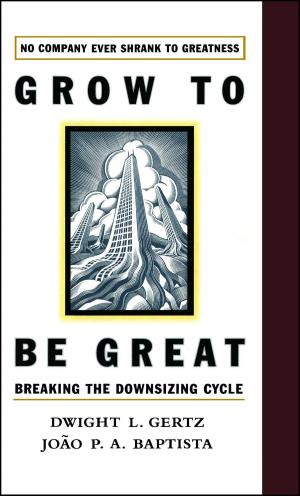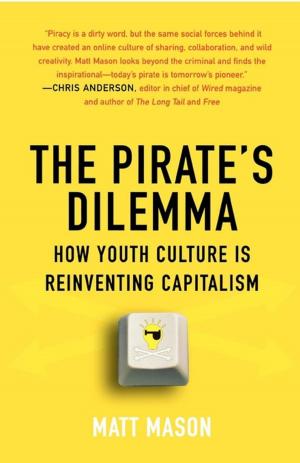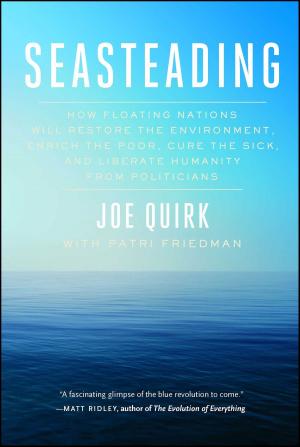The Omega-3 Connection
The Groundbreaking Antidepression Diet and Brain Program
Nonfiction, Health & Well Being, Medical, Ailments & Diseases, Mental Health, Patient Care, Nutrition, Health| Author: | Dean Andrew L. Stoll, M.D. | ISBN: | 9780743217200 |
| Publisher: | Free Press | Publication: | August 9, 2001 |
| Imprint: | Free Press | Language: | English |
| Author: | Dean Andrew L. Stoll, M.D. |
| ISBN: | 9780743217200 |
| Publisher: | Free Press |
| Publication: | August 9, 2001 |
| Imprint: | Free Press |
| Language: | English |
For years scientists have searched for a "magic bullet" to relieve the pain of depression and other mood disorders -- safe enough for nursing mothers, children with ADHD, and the elderly, without the side effects associated with medicines like Prozac, Zoloft, and lithium. Now the search may finally be over, thanks to the Omega-3 Renewal Plan, introduced here by Andrew L. Stoll, M.D., Director of the Psycho-pharmacology Research Laboratory at Harvard's McLean Hospital.
In his groundbreaking research, Stoll found that omega-3 fatty acids, already known for their importance in preventing heart disease, Crohn's disease, rheumatoid arthritis, and cancer, play a crucial role in mental health -- regulating and en-hancing mood, sharpening memory, and even aiding concentration and learning. And these remarkable substances, so essential to our health, are found abundantly in common fish oils and other sources.
The bad news is that even though omega-3 fatty acids have played a critical role in our evolutionary past, these extraordinary substances have been depleted by our Western diet and lifestyle, and the resulting nutritional imbalance seems to have led to a sharp rise in heart disease and depression. By contrast, in Japan and other countries where fish consumption is high, both heart disease and depression rates are low. Stoll explains how easily omega-3s can be used up in just a few generations, and how a new mother with depleted omega-3s loses still more to her baby -- a fact that may account for the severe postpartum depression so many women suffer. He documents evidence that a shortage of omega-3s may also play a role in attention deficit-hyperactivity disorder (ADHD) and other learning problems. The good news is that this downward spiral of depletion and depression can finally be reversed.
In his revolutionary Omega-3 Renewal Plan, Dr. Stoll presents readers for the first time with all the tools for restoring their natural balance of omega-3 fatty acids, including which foods to eat and how to choose the most effective over-the-counter supplements. Featuring information on how to integrate flaxseed and fish oils into diet and medication plans, and including simple recipes as well as supplement dosages and sources, The Omega-3 Connection offers an entirely new, practical method for improving mental health.
For years scientists have searched for a "magic bullet" to relieve the pain of depression and other mood disorders -- safe enough for nursing mothers, children with ADHD, and the elderly, without the side effects associated with medicines like Prozac, Zoloft, and lithium. Now the search may finally be over, thanks to the Omega-3 Renewal Plan, introduced here by Andrew L. Stoll, M.D., Director of the Psycho-pharmacology Research Laboratory at Harvard's McLean Hospital.
In his groundbreaking research, Stoll found that omega-3 fatty acids, already known for their importance in preventing heart disease, Crohn's disease, rheumatoid arthritis, and cancer, play a crucial role in mental health -- regulating and en-hancing mood, sharpening memory, and even aiding concentration and learning. And these remarkable substances, so essential to our health, are found abundantly in common fish oils and other sources.
The bad news is that even though omega-3 fatty acids have played a critical role in our evolutionary past, these extraordinary substances have been depleted by our Western diet and lifestyle, and the resulting nutritional imbalance seems to have led to a sharp rise in heart disease and depression. By contrast, in Japan and other countries where fish consumption is high, both heart disease and depression rates are low. Stoll explains how easily omega-3s can be used up in just a few generations, and how a new mother with depleted omega-3s loses still more to her baby -- a fact that may account for the severe postpartum depression so many women suffer. He documents evidence that a shortage of omega-3s may also play a role in attention deficit-hyperactivity disorder (ADHD) and other learning problems. The good news is that this downward spiral of depletion and depression can finally be reversed.
In his revolutionary Omega-3 Renewal Plan, Dr. Stoll presents readers for the first time with all the tools for restoring their natural balance of omega-3 fatty acids, including which foods to eat and how to choose the most effective over-the-counter supplements. Featuring information on how to integrate flaxseed and fish oils into diet and medication plans, and including simple recipes as well as supplement dosages and sources, The Omega-3 Connection offers an entirely new, practical method for improving mental health.
